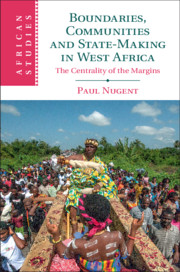Book contents
- Boundaries, Communities and State-Making in West Africa
- African Studies Series
- Boundaries, Communities and State-Making in West Africa
- Copyright page
- Dedication
- Contents
- Figures
- Maps
- Tables
- Acknowledgements
- Abbreviations
- 1 Centring the Margins
- Part I From Frontiers to Boundaries
- Part II States and Taxes, Land and Mobility
- 4 Constructing the Compound, Keeping the Gate
- 5 Being Seen Like a State
- 6 Border Regulation and State-Making at the Margins
- 7 Land, Belief and Belonging in the Borderlands
- Part III Decolonization and Boundary Closure, c.1939–1969
- Part IV States, Social Contracts and Respacing from Below, c.1970–2010
- Conclusion
- Bibliography
- Index
- African Studies Series
6 - Border Regulation and State-Making at the Margins
Taxation, Migration and Contraband during the Interwar Years
from Part II - States and Taxes, Land and Mobility
Published online by Cambridge University Press: 08 June 2019
- Boundaries, Communities and State-Making in West Africa
- African Studies Series
- Boundaries, Communities and State-Making in West Africa
- Copyright page
- Dedication
- Contents
- Figures
- Maps
- Tables
- Acknowledgements
- Abbreviations
- 1 Centring the Margins
- Part I From Frontiers to Boundaries
- Part II States and Taxes, Land and Mobility
- 4 Constructing the Compound, Keeping the Gate
- 5 Being Seen Like a State
- 6 Border Regulation and State-Making at the Margins
- 7 Land, Belief and Belonging in the Borderlands
- Part III Decolonization and Boundary Closure, c.1939–1969
- Part IV States, Social Contracts and Respacing from Below, c.1970–2010
- Conclusion
- Bibliography
- Index
- African Studies Series
Summary
Having dealt with the implantation of administrative structures, I turn now to the borderlands as sites of regulation. My aim is, firstly, to reveal in much greater detail the different ways in which the border dynamics became woven into processes of state-making during the interwar period. In the Senegambia, the fundamental issue was the management of mobility, which ultimately proved conducive to the development of relatively open borders. In the trans-Volta, the energies of state officials were concentrated on regulating commodity flows. These contrasting imperatives involved a different range of actors, including traditional authorities whose own relationship to the central state was forged through the daily routines of border control. Secondly, the chapter seeks to account for some of the differences that unfolded on the two sides of the borders in question, resulting not just from divergent government priorities, but also from the fundamental incompatibilities between them. Although there were moments of selfless co-operation – mostly witnessed at times of crisis such as armed rebellion or war – colonial administrations tended to regard each other as competitors. While officials suspected their counterparts of conspiring with border populations to frustrate their own efforts, they also expressed sympathy with populations that were subject to the neighbouring administration.
- Type
- Chapter
- Information
- Boundaries, Communities and State-Making in West AfricaThe Centrality of the Margins, pp. 229 - 271Publisher: Cambridge University PressPrint publication year: 2019



